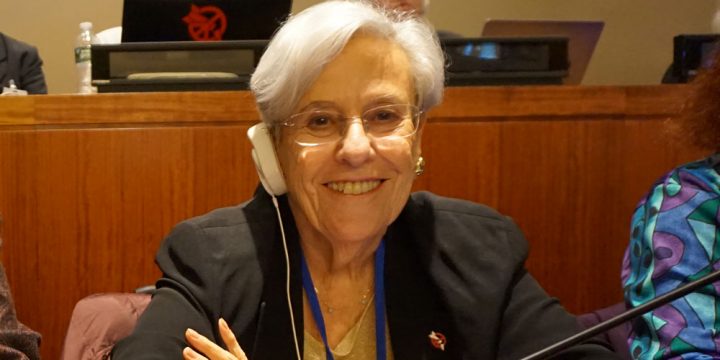Those of us laboring in the wasteland of nuclear arms control and countless thwarted attempts to abolish nuclear weapons have been witnessing one of the most striking shifts in the global paradigm of how the world thinks about nuclear weapons which has brought us to this present glorious moment. The world is now poised on the eve of actually completing negotiations for a treaty to ban the bomb! The shift, which has proceeded so rapidly, relative to other efforts to curb nuclear weapons, can largely be attributed to the transformation of the public conversation about nuclear weapons, from the same old, same old talk, about national “security” and its reliance on “nuclear deterrence”, to the widely promoted and publicized well-founded scientific evidence of the catastrophic humanitarian consequences which would result from the use of these lethal instruments of death and destruction.
A series of forceful and convincing presentations of the devastating effects of nuclear catastrophe organized by enlightened governments and civil society’s International Campaign to Abolish Nuclear Weapons (ICAN) was inspired by a stunning statement from the International Committee of the Red Cross addressing the humanitarian consequences of nuclear war which was referenced in the 2000 Non-Proliferation Treaty outcome document. ICAN subsequently organized a global turnout of activists from every corner of the world at three subsequent meetings hosted by Norway, Mexico and Austria, demonstrating the overwhelming evidence of the disastrous devastation threatening humanity from nuclear weapons– their mining, milling, production, testing and use– whether deliberately or by accident or negligence, and the unbearable consequences that could be visited upon our Mother Earth. This new knowledge, exposing the terrifying havoc that could be inflicted on our planet, gave the impetus for the present moment at the UN where governments and civil society are now engaged in fulfilling a negotiating mandate for a treaty to prohibit nuclear weapons leading towards their total elimination.
It would be useful to examine even more closely the concept of “security” and deconstruct it for future use as we work to bring an end to war on the planet. Peace activists refer to “human security” as a way of distinguishing humanitarian concerns from the military’s use of the term “security”. But there are contradictions inherent in the concept of security reflected in the etymology of the very word “security” itself. Derived from the Latin se cura, or free from care ,” security can be understood not only as freedom from care, worries or attention — of being carefree — but also as being careless. And it is ironic that carelessness– failing to pay sufficient attention to or care for one’s surroundings, will result in conditions that are destructive of wellbeing, or safety, the very opposite of what people are seeking when they talk about national “security”. How careless some nations have been in equating their security with massive weapons systems capable of destroying all life on earth. To truly free ourselves of the mistaken notion represented by the word “security”, we must act with care and reevaluate and explore the conditions that will truly bring the positive benefits of real safety in the peace that humanity has always longed for.
Alice Slater represents the Nuclear Age Peace Foundation at the UN and serves on the Coordinating Committee of World Beyond War.
Reprinted from Nuclear Ban Daily, Reaching Critical Will, 7/3/17, Vol. 2, No. 11










